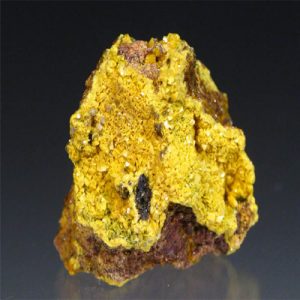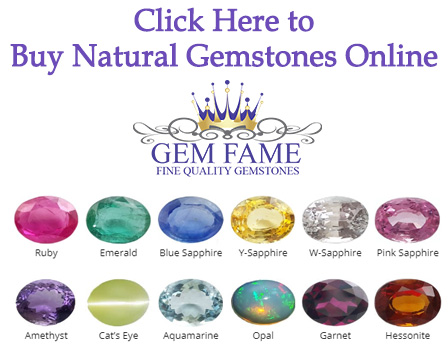Soddyite
Soddyite is a hydrated uranyl silicate mineral that is very strongly radioactive due to its uranium (U) content of over 71%. It is also fluorescent showing weak orange yellow under both shortwave and longwave UV. Its type locality is the Shinkolobwe Mine (Kasolo Mine), Katanga (Shaba), Democratic Republic of Congo (Zaïre). This mine is the type locality for quite a few uranium minerals. At this and other localities Soddyite is often closely associated with other radioactive minerals such as Cuprosklodowskite, Curite, Kasolite, Sklodowskite, Swamboite, Torbernite and Uranophane. The picture above shows yellow Soddyite associated with green Cuprosklodowskite. Soddyite mineral specimens are very attractive with its bright yellow crystals set with other brightly colored minerals such as green Cuprosklodowskite. Faceted gems are extremely rare and unusual.
Soddyite is named after Frederick Soddy (1877 – 1956), British physicist and radiochemist.
As with all radioactive minerals always wash hands after handling. Avoid inhaling dust when handling or breaking. Never lick or ingest. Avoid prolonged exposure in proximity of the body. Store away from inhabited areas.
Locations for Soddyite: From Kasolo, Swambo, and in the Musonoi mine, Kolwezi, Katanga Province, Congo (Shaba Province, Zaire). At the Norrabees pegmatite, Namaqualand, Cape Province, South Africa. In the Krunkelbachtal mine, near Menzenschwand, Black Forest, Germany. In the USA, in the Ruggles pegmatite, Grafton, Grafton County, New Hampshire; at the Steel City mine, Yavapai County, Arizona; from the Jackpile mine, Laguna, Valencia County, New Mexico; in the Lucky Mc mine, Fremont County, Wyoming; from the Honeycomb Hills, Juab County, Utah; and at the Lookout No. 22 claim, Marshall Pass, Saguache County, Colorado. On Mt. Painter, Flinders Ranges, South Australia, and from South Alligator Valley, Northern Territory, Australia.
| Chemical Formula: | (UO2)2SiO4 · 2H2O |
| Hydrated Uranyl Silicate | |
| Molecular Weight: | 668.17 gm |
| Composition: | Uranium | 71.25 % | U | 80.83 % | UO2 |
| Silicon | 4.20 % | Si | 8.99 % | SiO2 | |
| Hydrogen | 0.60 % | H | 5.39 % | H2O | |
| Oxygen | 23.95 % | O | |||
| 100.00 % | 95.21 % | = TOTAL OXIDE |
| Crystallography: | Orthorhombic – Dipyramidal |
| Crystal Habit: | As crystals of pyramidal to platy habit, to 3 mm. As subparallel to divergent crystal clusters; in cross-fiber veinlets; also massive to earthy. |
| Twinning: | None |
| Cleavage: | Perfect on {001}, good on {111} |
| Fracture: | Conchoidal |
| Tenacity: | Brittle |
| Moh’s Hardness: | 3.5 |
| Density: | 4.63 – 4.70 (g/cm3) |
| Luminescence: | Fluorescent, Short UV = weak orange yellow, Long UV = weak orange yellow |
| Radioactivity: | Very Strong; GRapi = 5,126,250.25 (Gamma Ray American Petroleum Institute Units) |
| Health Warning: | Contains uranium – always wash hands after handling. Avoid inhaling dust when handling or breaking. Never lick or ingest. Avoid prolonged exposure in proximity of the body. Store away from inhabited areas. |
| Color: | Amber to yellow or greenish yellow |
| Transparency: | Transparent, Translucent, Opaque |
| Luster: | Vitreous to adamantine, dull when earthy |
| Refractive Index: | 1.650 – 1.715 Biaxial ( – ) |
| Birefringence: | 0.049 – 0.061 |
| Dispersion: | Negligible to strong; r > v |
| Pleochroism: | X = colorless; Y = very pale yellow; Z = pale yellow-green |


